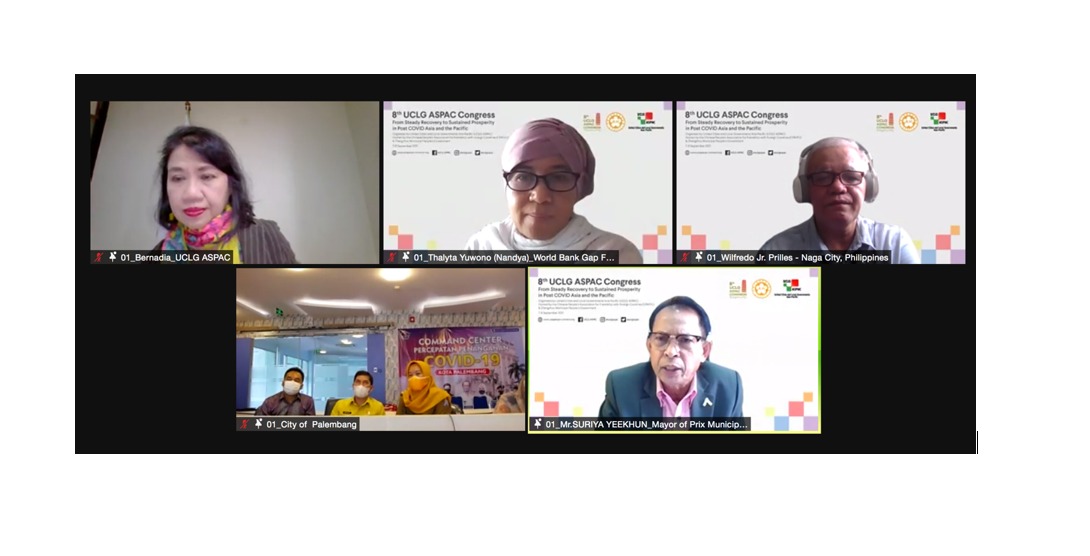The 8th UCLG ASPAC Congress held a series of side events over the course of two days with the multiplicity of issues on recovery towards prosperity, including economic issue on climate action. Ever since the pandemic overwhelmed cities in the region, it strikes plausible for local governments to focus on health issue. Yet, the crisis has enormously affected the progress made on sustainable development to thrive out of impacts due to climate change.
Drawing attention to climate action, the Global Covenant of Mayors (GCoM) led the first side event under the theme “Climate Financing and Budgeting”. On behalf of the GCoM Global-Regional Coordination, Mira Fajar Aviatri was present to welcome all of the speakers and the participants to the event. Mayor Mar-len Abigail Sombillo Binay from Makati City of Philippines, the Board Member of GCoM Board for Southeast Asia, strongly encouraged local governments to accelerate goals by breaking through the financing problems.
The Gap Fund by World Bank exists to provide technical assistance to help cities build back better. Through climate fund, the climate projects to achieve climate agenda would hopefully be feasible. Ms. Thalyta E. Yuwono (Nandya), Senior Urban Specialist, The World Bank Gap Fund Team, The World Bank South Asia, emphasised that, “We are not doing the implementation, but we are helping cities towards the implementation.”\
Dr. Bernadia I. Tjandradewi, Secretary General of UCLG ASPAC, moderated the event. The importance of togetherness regardless of the size of the city and the size of the region was emphasised under any economic condition.
A number of speakers from local governments also gathered on climate issue. Suriya Yeekhun, Chairman of the Foreign Affairs Committee, National Municipal League of Thailand, admitted the financing problem in Prik Municipality as stated, “We normally have very few budget, because we are a small municipality.” However, the government is committed to achieve climate resilience.
Wilfredo B. Prilles, Jr., City Planning and Development Coordinator, Naga City of Philippines, was keen to share that there were guides and books available to put forward climate projects backed up with the law to do implementation. The government assures that any projects in the city are at the heart of popular concern. Putting the community as the priority, Naga City has carried out several successful projects.
Sri Maryati, Head of International Cooperation Sub-division, Palembang City of Indonesia, talked about various issues on climate action in Palembang. These were waste management, climate change management (flood), greenhouse gas emissions mitigation, and disaster resilient education.
Overall, secondary cities are greatly considered to submit proposals for climate fund through The Gap Fund by World Bank. The climate fund is open to more cities other than the big capital cities to implement climate agenda.
Enclosing the event, Alexandra Lehmann, Attaché, Foreign Policy Instruments on behalf of European Union (EU) Delegation to the P.R. of China, appreciated the stakeholders involved in the event. Additionally, it was agreed that, “We are witnessing every day in the news the dramatic effects the climate change can have.”
Acting alone is not enough, so global collaboration is the key to tackle climate change. This encompasses steps to reduce greenhouse emissions and achieve carbon-neutral for climate adaptation. Leaving no one behind through programs in Asia to support cities in order to go the extra miles, EU offers technical expertise with the help of GCoM and World Bank. Lastly, EU wishes to make the opportunities to work together a reality.








